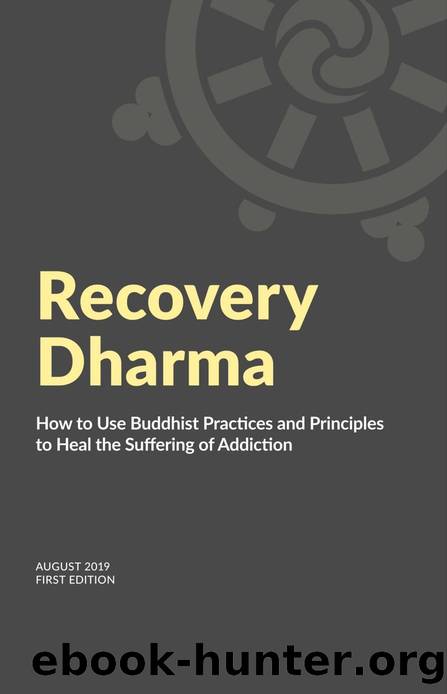Recovery Dharma: How to Use Buddhist Practices and Principles to Heal the Suffering of Addiction by Recovery Dharma

Author:Recovery Dharma [Dharma, Recovery]
Language: eng
Format: epub
ISBN: 9781086040005
Google: t-7RzgEACAAJ
Amazon: 1086040007
Publisher: Recovery Dharma
Published: 2019-07-29T22:00:00+00:00
Think about times when you felt fear, doubt, or hesitation. Now, let yourself become aware of their temporary nature. How might that awareness have led to an outcome that was less harmful?
Wise Concentration
The final aspect of the Eightfold Path is Wise Concentration. Meditation practice begins with concentrating on the breath, the body, the emotional tone of the moment, and the processes of the mind itself, because these things exist in the present. If we focus on breath, for example, weâre paying attention to the present moment because our breathing is immediate: itâs happening right now. Breathing is a natural process that doesnât require judgment or interpretation, and so it eases the mind from the need to react.
The purpose of concentration is to train the mind to be focused and undistracted. This circles back to the wisdom section, where we try to be focused on wise understanding and wise thought, without being distracted by habitual perceptions and reactivity.
Most of us, early in meditation practice, are distracted by things around us. Our concentration is interrupted by a noise outside the room, a pain or discomfort in our bodies, our own worries or judgments of the experience, boredom or weariness, or thoughts and plans. These distractions can lead to a feeling of unease or restlessness. This is perfectly normal. In our addictions, we nurtured the habit of distracting ourselves; for many of us, it has become a survival technique. Concentration meditation gives us the opportunity to meet this habit with kindness and patience rather than resistance.
Concentration, like the rest of the factors of the Eightfold Path, is a practice. As with any practice, it takes time and effort to learn a new way to focus attention. In meditation, simply noting the distraction, accepting that it exists, and then refocusing, is the practice. If we become consumed with discomfort, thoughts, or distraction, we need to first recognize that itâs happening, and then become curious about it. Then we can make the choice to refocusâto concentrate on the object of the meditation. Our habitual patterns can seduce us into thinking weâre doing it wrong, into judging our practice, or into giving up. Donât let them. When we observe what the mind is telling us and react with compassion, knowing we have the power to recognize it and refocus it, we strengthen our ability to concentrate.
Concentration can be especially helpful in times of craving. Instead of getting lost in the delusion that we must have what weâre craving, we can trust that the craving is only temporary and refocus our attention on our intention to act wisely. This may simply be the three-breath pause mentioned earlier, or a more formal sitting meditation concentrating on the breath. We can use concentration meditation to train our minds to focus on a wholesome thought in the midst of temporary discomfort and the yearning for a quick fix. This may take the form of repeated phrases to focus and clear the mind, such as metta, compassion, or equanimity meditations. For
Download
This site does not store any files on its server. We only index and link to content provided by other sites. Please contact the content providers to delete copyright contents if any and email us, we'll remove relevant links or contents immediately.
Spare by Prince Harry The Duke of Sussex(5195)
Machine Learning at Scale with H2O by Gregory Keys | David Whiting(4312)
Fairy Tale by Stephen King(3394)
Will by Will Smith(2919)
The Bullet Journal Method by Ryder Carroll(2572)
Hooked: A Dark, Contemporary Romance (Never After Series) by Emily McIntire(2553)
It Starts With Us (It Ends with Us #2) by Colleen Hoover(2367)
Rationality by Steven Pinker(2363)
Can't Hurt Me: Master Your Mind and Defy the Odds - Clean Edition by David Goggins(2339)
Friends, Lovers, and the Big Terrible Thing by Matthew Perry(2230)
The Becoming by Nora Roberts(2201)
Love on the Brain by Ali Hazelwood(2074)
A Short History of War by Jeremy Black(1848)
The Strength In Our Scars by Bianca Sparacino(1842)
HBR's 10 Must Reads 2022 by Harvard Business Review(1842)
A Game of Thrones (The Illustrated Edition) by George R. R. Martin(1744)
Leviathan Falls (The Expanse Book 9) by James S. A. Corey(1743)
515945210 by Unknown(1665)
Bewilderment by Richard Powers(1619)
